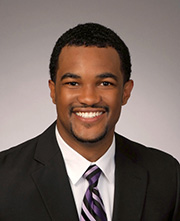Pathway to Feinberg: Quentin Youmans, MD

When I was growing up, I was fascinated with animals. I can remember playing with rollie pollies in my backyard in South Carolina and catching fireflies in glass mason jars. I loved watching them illuminate, dim and light up again as dusk would set in on late summer nights. When my parents would ask me what I wanted to be when I grew up, for the longest time my answer was a veterinarian. I was innately, I think, interested in the inner workings of organisms and, more specifically, how to make those inner workings work better when they had gone awry. As I grew older, my interest shifted from the furry and four-legged to the more familiar creature in the kingdom Animalia: the human. With medicine, I could try to fix what might be ailing the patient physically, but also have that personal connection with the patient — that relationship of trust and camaraderie — as we worked as a team toward healing.
At Brown University, my major was human biology, with a focus on human health and disease. I was able to explore the social determinants of health and learned how disparities in socioeconomic status could affect one’s access to care. I connected what I was learning to my own experiences. As an African American man growing up in the southern United States, I was no stranger to racism. I have been stopped by the police in my own neighborhood more than once just trying to make it home. And I can’t recall the number of times I have been followed in a store. I had always been aware of the disparities in treatment. To learn how that played out on a societal level, and ultimately affected whether people lived or died, was edifying and exasperating at the same time.
After college, I participated in a research program at Mount Sinai in New York City. The laboratory that I joined was a cardiac tissue engineering lab. Living in NYC was incredible! I will always remember seeing "The Lion King" on Broadway. I sang a capella in undergrad, so hearing those voices live was amazing. I was considering for a time doing an MD-PhD program because I enjoyed the work that we did so much. My project was examining wound healing and creating models in the lab that could mimic real life. Ultimately, I decided my love for patients overrode my love for research, and I realized that I could still be involved in active research with an MD.
When it came time for me to apply for medical school, I knew that I wanted to stay in a major city. The hustle and bustle was exciting. And the diverse patient population afforded to one in a city is unparalleled. I wanted to be exposed to people from all walks of life — from different backgrounds, cultures and beliefs. This would allow me to encounter a diverse array of disease processes and would ensure that I learned from my patients every single day. Medical education is as much about learning about people as it is about anatomy or physiology.
I was lucky enough to interview at many great institutions along my interview trail. I traveled the country talking with students about their experiences: what they loved and hated about their programs. Most places were nice enough. They all touted their early clinical experience, or advanced curriculum that incorporated this acronym or that. Honestly, it was all kind of a blur until I got to Northwestern. Even before my interview, I remember receiving an email from the then Office of Minority and Cultural Affairs (now the Office of Diversity and Inclusion). I felt welcomed from day one. The curriculum made sense to me. I liked that we had time outside of class to synthesize the information that we had to learn. The most important factor for me was the people. The people at Feinberg are incredible. They are warm and knowledgeable. We have excellent teachers here who take educating the next generation of physicians very seriously. I felt like I had a family at Northwestern, and that feeling has only grown over my six years here.
Medical school was long and hard. But from test after test, and rotation after rotation, I had my friends and my mentors to help me through. When it came time for me to apply for residency I knew it was going to be hard for me to leave. Especially as I met my now-wife at an Office of Diversity and Inclusion event! I again hit the road around the country. No place made me feel as comfortable or as happy as Northwestern.
I am planning a career in academic medicine. I love teaching. I love seeing the thirst for knowledge in a young student’s eyes. Northwestern has equipped me with the tools to be an excellent academic physician. The motto of our internal medicine residency program is “nice, hard working and smart,” and the nice comes first. Every day I wake up and try to approach my responsibilities with that mindset. It hasn’t failed me yet.
I have come such a long way since catching fireflies in my backyard. At times I miss those days, the carefree innocence. But I relish the opportunity afforded me to see students’ passions ignite, like those fireflies, as they learn, and reach, and aspire. I look forward to what the future brings and am thankful for the gift that Feinberg has given me.